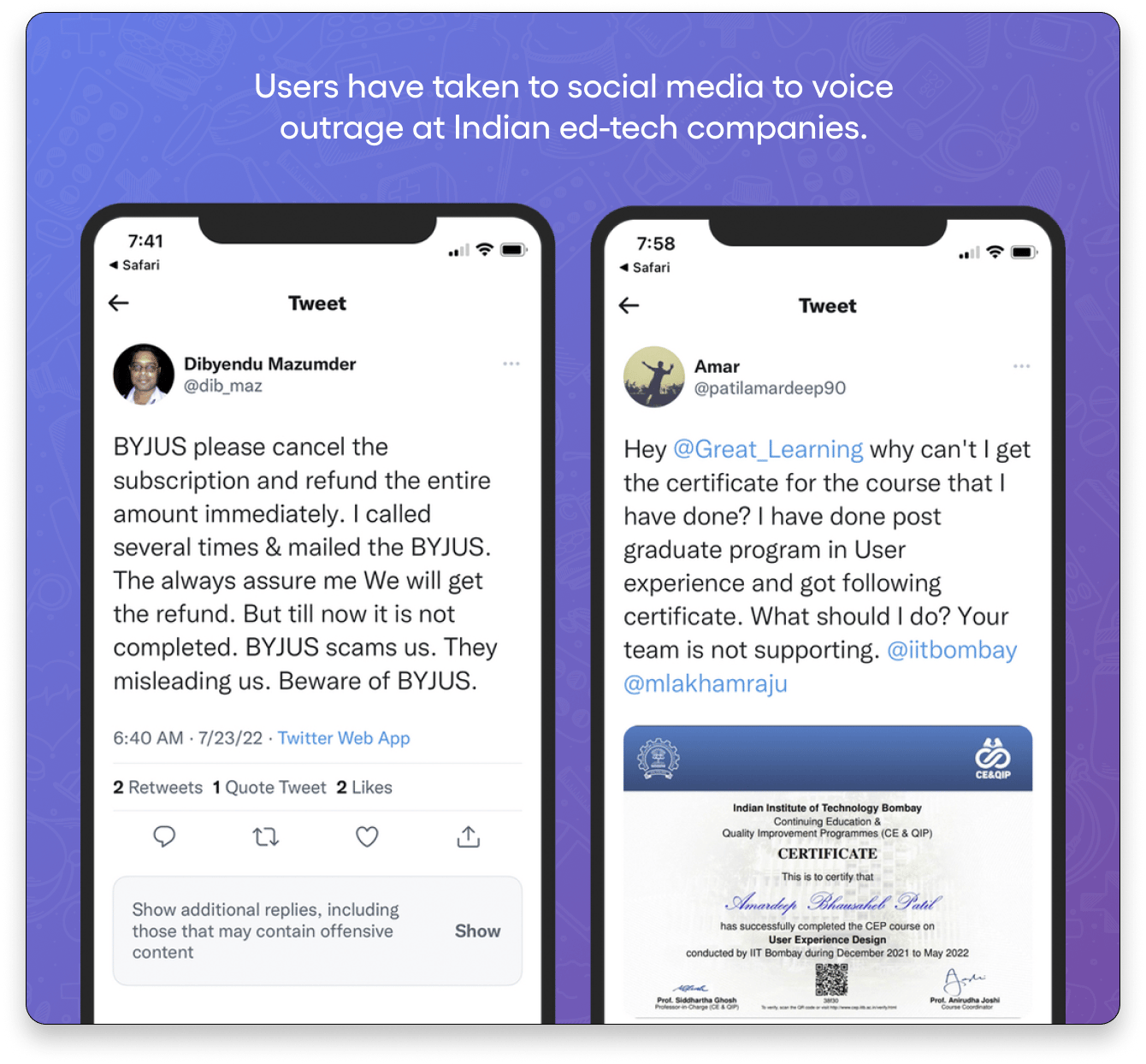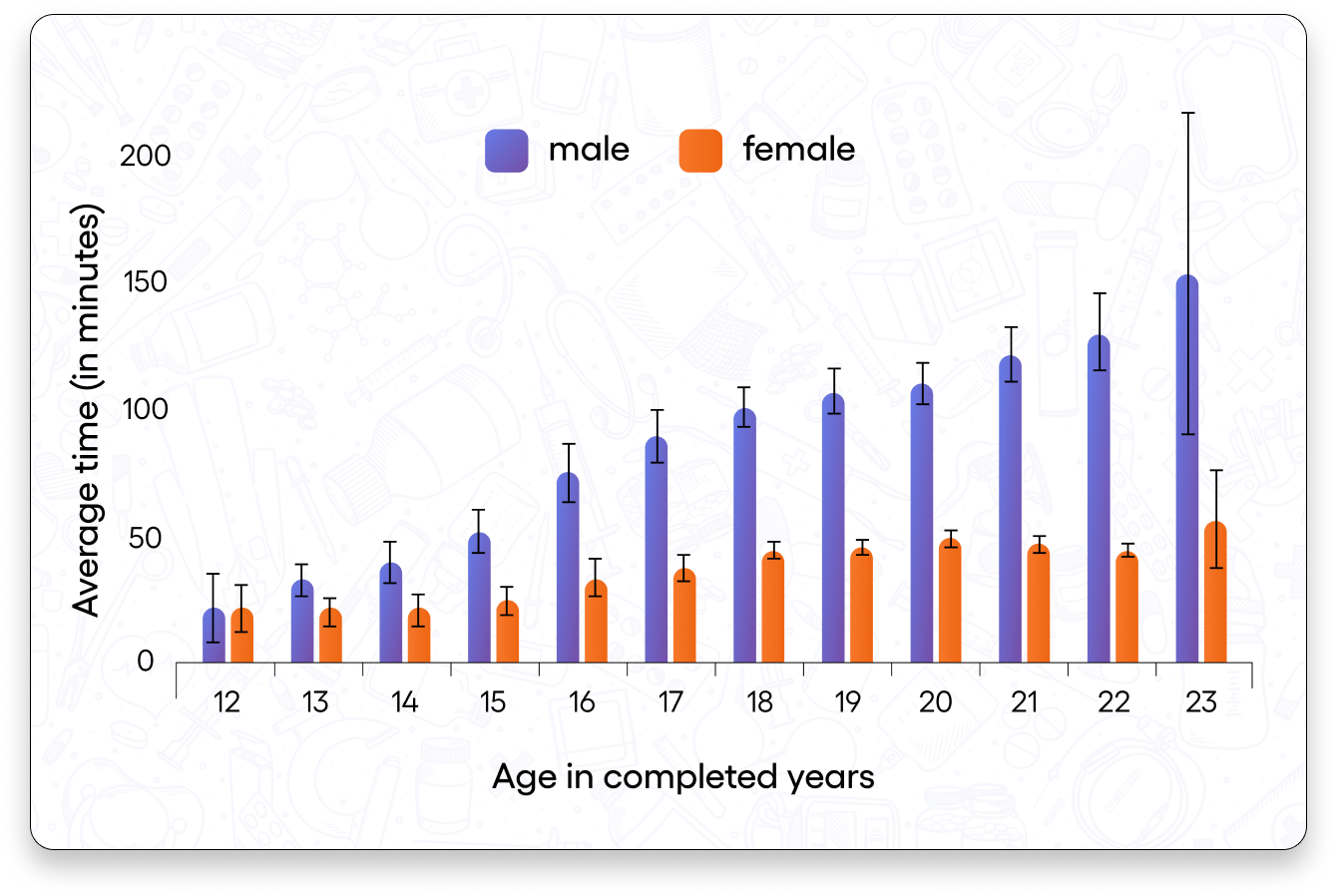- Ritesh Malik
- Posts
- classes. more classes. even more classes.
classes. more classes. even more classes.
but we need to start recognising that our kids are in a rat race...
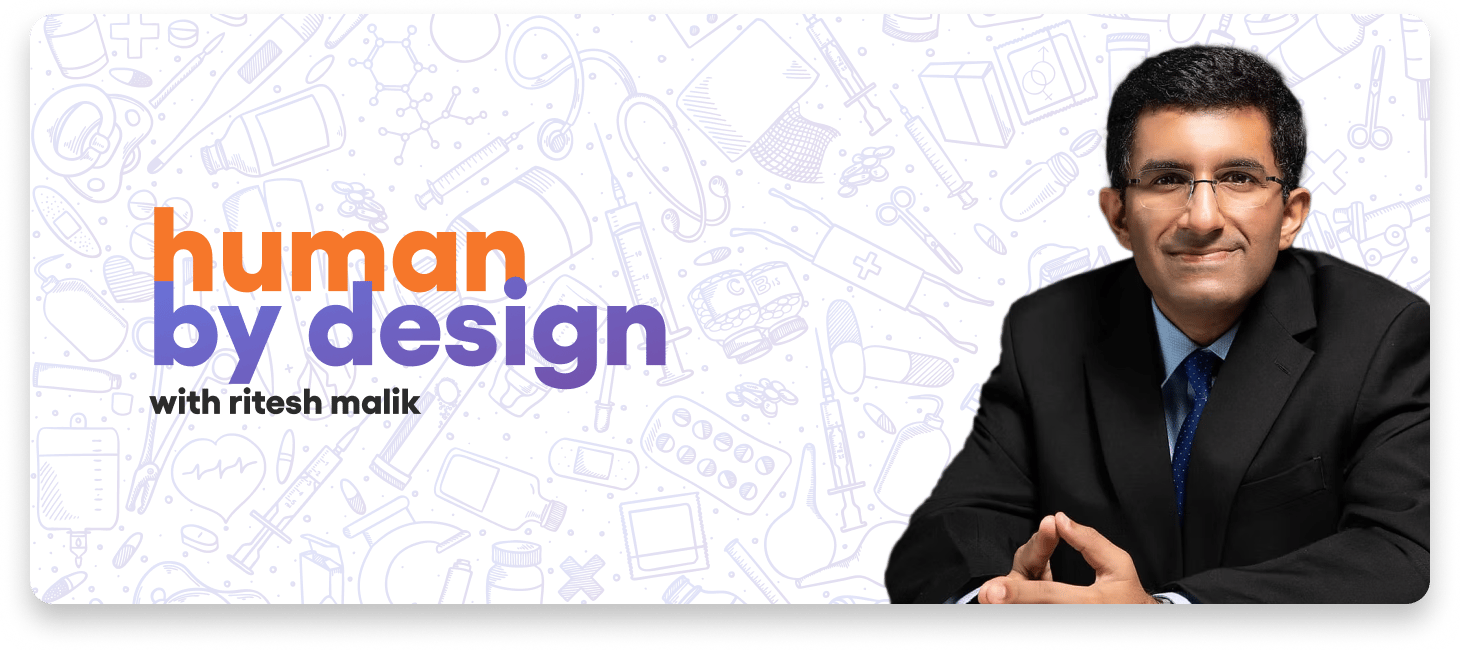
Have you enrolled in an edtech course before? |
Last week, my neighbor Sangeeta mentioned she'd enrolled her 8-year-old in a "premium EdTech program" that cost ₹1.8 lakh for three years.
"It's adaptive learning," she said proudly.
"The AI personalizes everything for him."
I asked how it was going.
"Well, he's spending 3 hours daily on the app, but his attention span has gotten worse. And he has meltdowns when the app shows him behind other kids on the leaderboard."
Then she said something that stopped me cold: "But the app says he's 'progressing,' so it must be working, right?"
That's when I realized we've created the perfect scam.
EdTech companies have convinced Indian parents that anxiety equals learning

Two months ago, I was visiting my friend's house when his 10-year-old daughter started crying because she couldn't solve a math problem on her tablet.
Not frustrated crying. Panic crying.
"I'm going to fall behind everyone else," she sobbed.
"The app will put me in the red zone again."
I watched this kid, who should be playing with friends, having a breakdown over an algorithm designed to keep her hooked to a screen.
That's when it hit me: We're not buying education anymore. We're buying anxiety subscriptions.
BYJU'S just collapsed 99% from $22 billion to essentially zero. But the real casualty isn't investor money: it's an entire generation of kids who now associate learning with stress.
What nobody tells you about the "personalized learning" lie
Every EdTech company sells the same fantasy: AI that adapts to your child's pace, making learning "fun" and "effective."
Here's what's actually happening.
These apps use the same psychological tricks as social media and gaming.
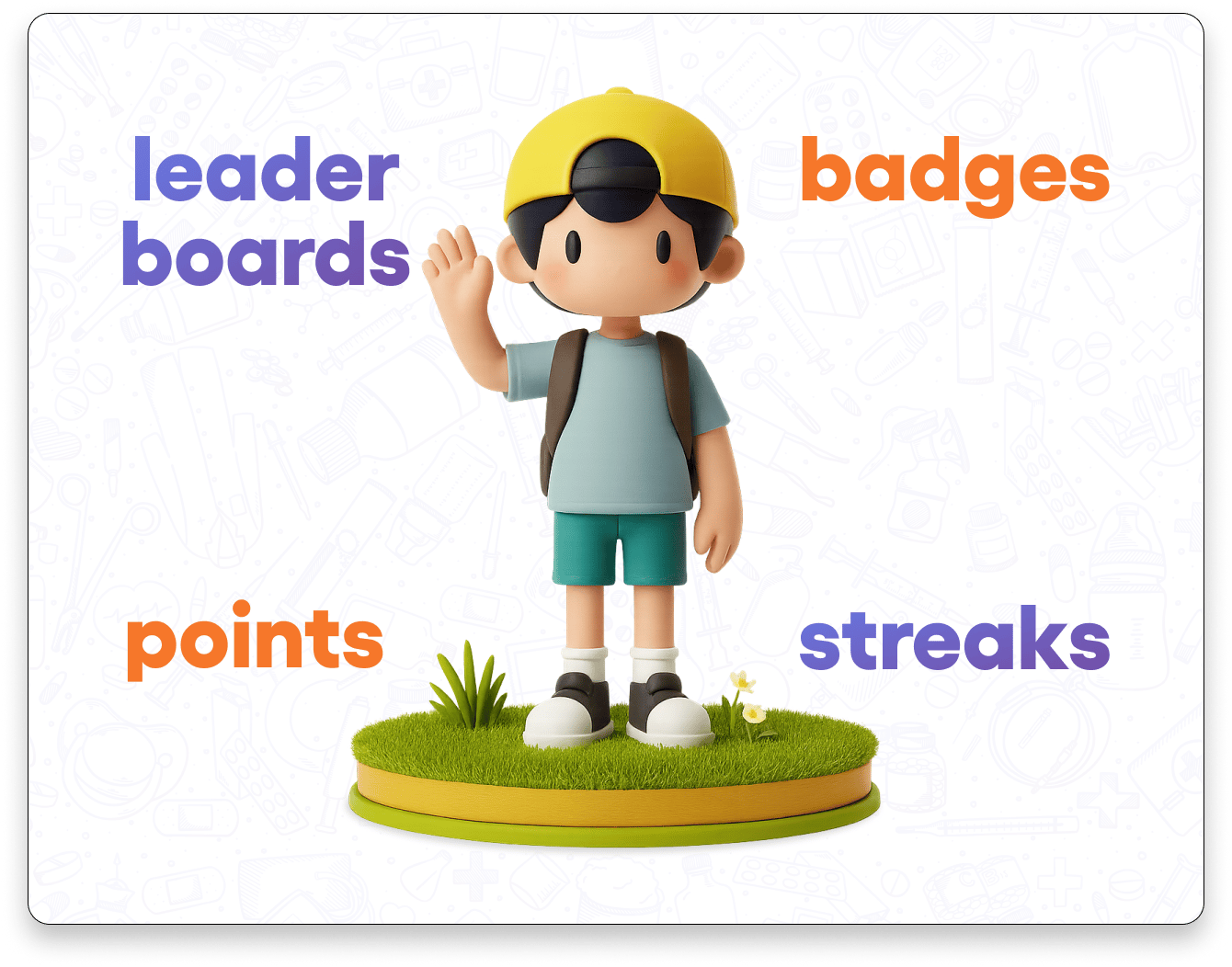
The dopamine hits that keep adults scrolling Facebook for hours.
Except now we're doing it to 8-year-olds and calling it education.
Research shows 69.9% of Indian students now exhibit moderate to high anxiety levels directly linked to these platforms. The "personalized learning" is actually personalized anxiety.
Think about it. When your child opens that app, what happens?
They see where they rank compared to other kids.
They get stressed about maintaining streaks.
They panic about "falling behind" on arbitrary metrics that have nothing to do with actual understanding.
We've turned learning, which should be joyful exploration, into a competitive nightmare.

While researching this, I discovered something that will haunt me forever.
92% of children lost foundational language abilities during the EdTech boom.
Let me repeat that: Children forgot how to read properly because of too much screen-based learning.
The Azim Premji University study looked at over 16,000 kids.
They found that the more time children spent on educational apps, the worse their actual comprehension became.
Meanwhile, parents spent ₹93,000 on average for 3-year EdTech courses, often taking loans they're still paying off while their kids struggle with basic reading.
We paid premium prices to make our children worse at learning.

As a result of the screen time, and these dark patterns, the kids are exhausted.
Studies show children using educational screens for over 2 hours daily have 55% higher odds of sleep problems. Girls are hit especially hard, showing nearly 3x higher odds of sleep disorders.
But parents don't connect the dots. They think Junior is tired from "working hard" on his studies.
Actually, the blue light from screens is destroying their circadian rhythms. Their brains can't wind down after hours of digital stimulation designed to keep them engaged.
And this isn’t restricted to Edtech.
Think of Gen Alpha. Nearly everyone I see has a smartphone with instagram or youtube. Some have started to create accounts at an early age.
They’re getting addicted.
Sleep-deprived kids can't learn effectively, creating a vicious cycle where parents buy more "help" for kids who are struggling because of screens.
The whole point of education is having pedagogy that feels experiential.
It’s about having teachers who are passionate about the students to feel joy in learning.
Not about half-baked classes only to charge more for extra hours or tuition.
I started thinking about how I learned math as a kid. My mother would sit with me, explain concepts, let me make mistakes, and guide me through problems. When I got frustrated, she'd tell me to take a break and come back later.
Everything wasn’t about being ranked or compared to others.
International research confirms that handwriting activates brain regions for memory formation in ways digital input cannot replicate. Students reading on paper show better comprehension and retention than those reading on screens.
The "old-fashioned" methods work because they're designed for how human brains actually learn.
EdTech companies convinced us that technology equals progress. But Finland, which has the world's best education system, is moving back to books after finding that excessive screen time hurts concentration.
We adopted Silicon Valley solutions for problems that didn't exist.

The cruelest irony?
EdTech promised to democratize education but actually made inequality worse.
Only 24% of Indian households have reliable internet. Among SC/ST students, only 4% had computer and internet access.
So while middle-class kids got addicted to anxiety-inducing apps, underprivileged kids, who couldn't access these platforms, actually maintained better learning outcomes by sticking with traditional methods.
The digital divide accidentally protected poor kids from digital learning damage.
And no, I’m not saying that learning online doesn’t work.
I’m saying that Edtech companies are ruining what education stands for in India.
I’ve seen hundreds of posts of teenagers who learn about stocks, engineering, coding all through YouTube and have become rather successful at an early age.
But as a culture, we need to start recognising that our kids are in a rat race for money.
Not to actually benefitting them.
Just try a few of these things and see how it changes your child’s future:
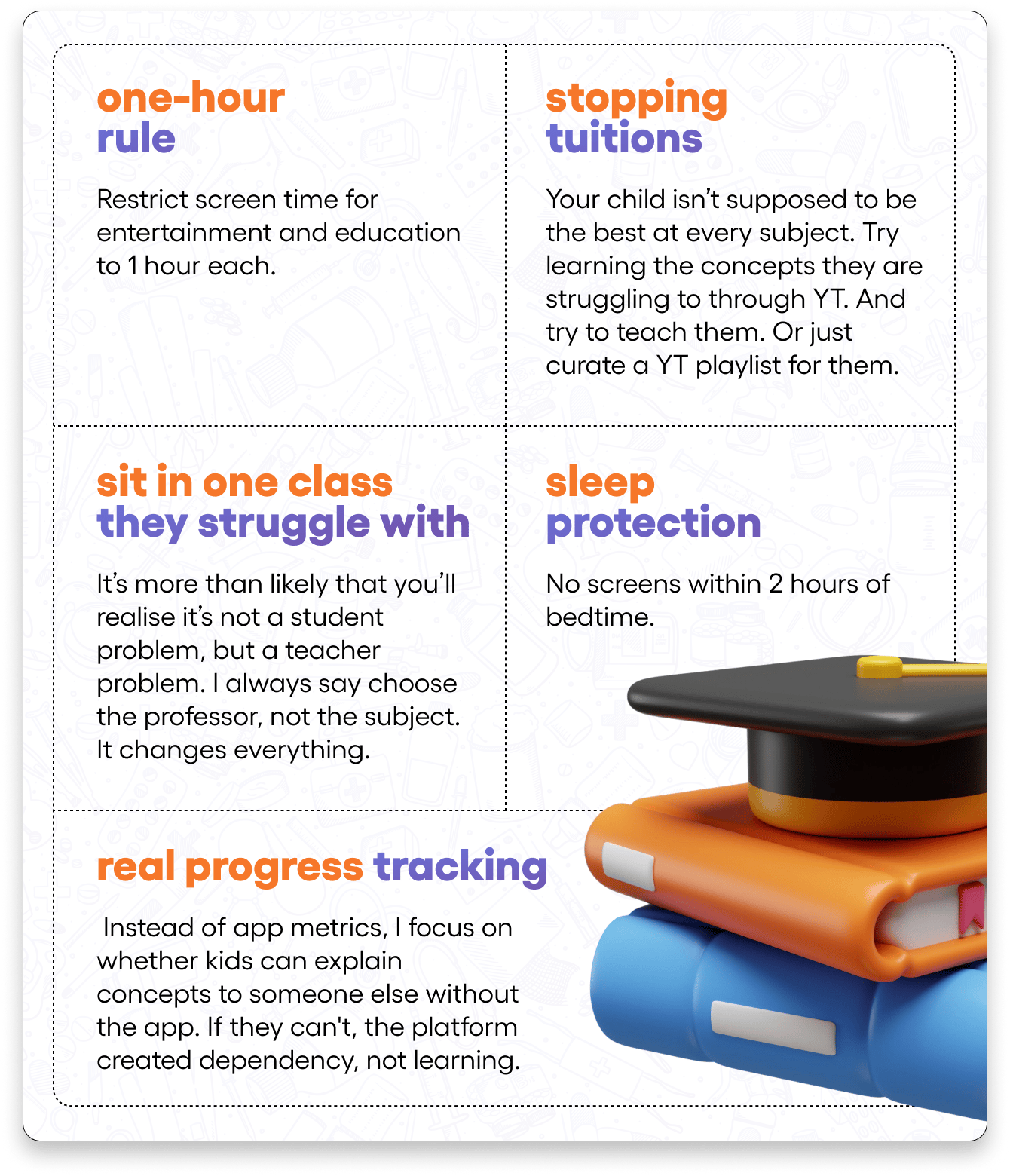
The EdTech crash isn't just about startups failing.
It's about recognizing that we turned our children into beta testers for addictive technology disguised as education.
Your child's mind isn't a market to be captured. It's a garden to be nurtured.
The data is clear: less screen time equals better learning outcomes and happier kids. The question is whether we're brave enough to admit we were wrong.
Until next week,
Ritesh
PS: I think there’s also a side towards increased cheating with edtech in general. With the rise of AI, and cost to proctor. Certifications are being handed out without any learnings. Edtech remains an opportunity for founders to solve.

